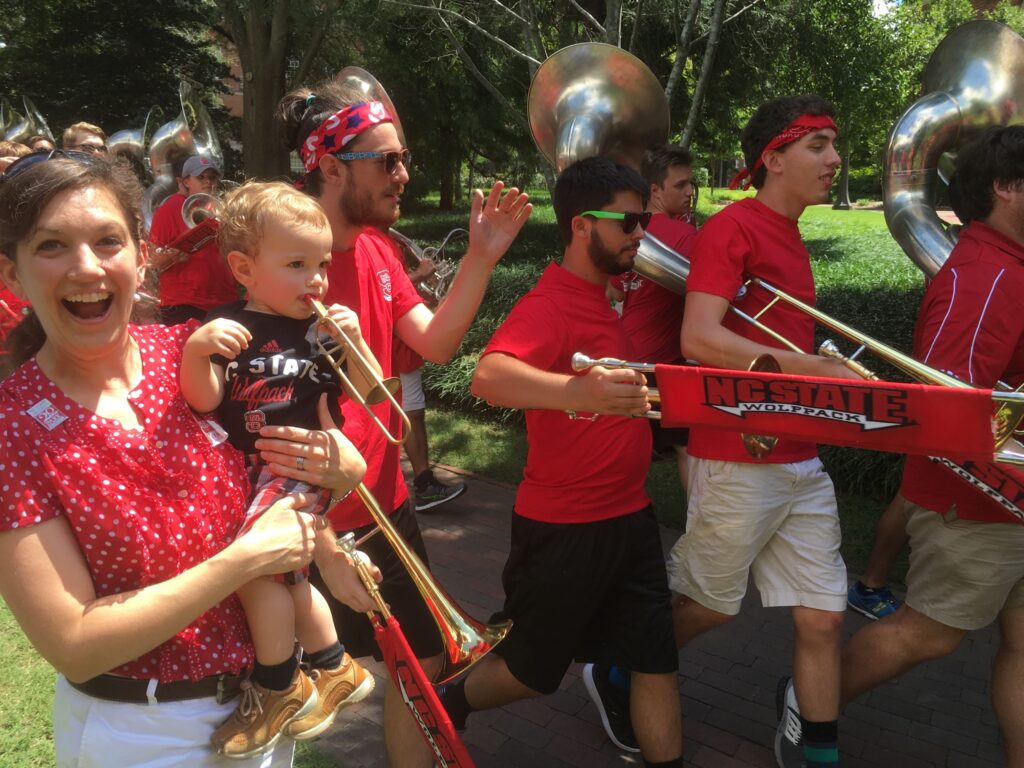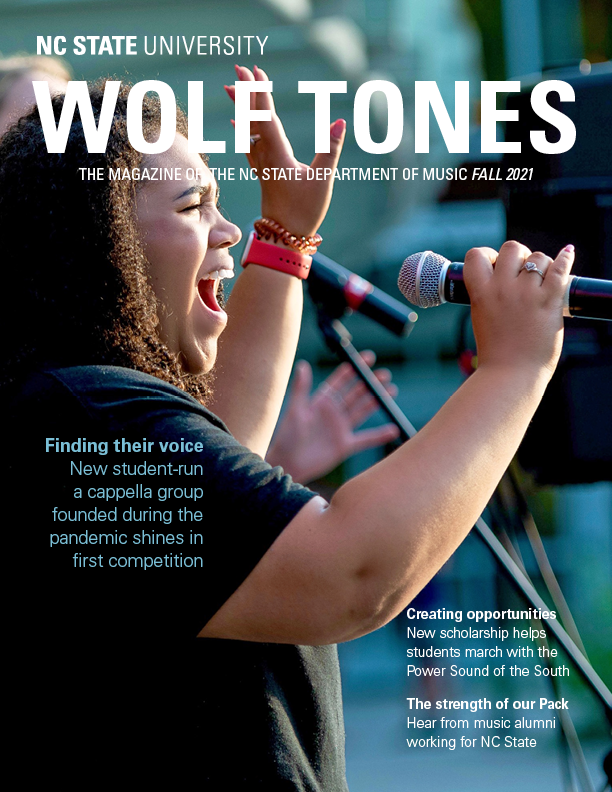This is an excerpt from an article originally published in the fall 2021 issue of Wolf Tones, the NC State Department of Music‘s alumni magazine.

Music department alumni working in faculty and staff positions at NC State are shaping a new generation, including many of our student-musicians. Here are their music stories.
There are dozens of music department alumni working at NC State. Many of them are former members of the Power Sound of the South marching band. Others performed in choirs, jazz ensembles, orchestras or concert bands. Some performed in every ensemble they could during their time as a student. For many, even though they haven’t made careers out of music, it has remained an important part of their lives. We caught up with a few of these alumni to hear about the role music played in their college experience, and the role it continues to play today.

Eva Feucht ’02
Director, Park Scholarships
BS, Science Education and BA, Chemistry, 2002
MEd, Higher Education Administration, 2009
Instruments
Trumpet, mallet percussion and voice
Ensembles taken at NC State
Marching band, jazz ensembles, State Chorale, pep band, wind ensemble, British brass band, indoor drum line
The impact of music on my NC State experience
The music department was a core component of my NC State journey. Traveling to sing in Carnegie Hall via the NC State Chorale with Dr. Al Sturgis and to compete in a national British brass band competition with Dr. Bob Petters were excellent ways to learn and grow as a musician. I formed relationships with people who are still some of my closest friends. My experiences with music at NC State provided a bridge to help me continue my involvement in musical ensembles—and the lifelong learning and community support that comes with these organizations—for life.
A favorite memory of making music at NC State
In high school marching band, I played mallet percussion from the sidelines (the pit) and was drum major. When I received the Park Scholarship, my college journey took an unexpected new path to North Carolina (from Virginia) and to NC State. I learned that the marching band didn’t have a pit; if I wanted to join, I’d need to learn a new instrument. I chose the trumpet because my younger brother played and because a neighbor had one I could borrow. I arrived at band camp with about two months of trumpet playing experience and had never actually marched in a show—only in parades. Long story short: I was not good—at playing trumpet, at marching, or at doing both at the same time. I probably played very few correct notes in my first few shows. The experience was enormously, valuably humbling. My fellow musicians and director Jack Fuller were always supportive. I found a culture where fun, camaraderie, and entertaining the audience were primary, and this gave me the room to be able to learn and grow even if I didn’t arrive with the strongest skill set. I worked hard to improve each year, and eventually became trumpet section leader, a role that allowed me to learn a lot and to encourage those who might have struggled like I did.

The role of music in my life today
After graduation, I joined Raleigh’s Little German Band and Dancers, and have now played with them for 18 years. I have also played in a neighborhood band, the Historic Oakwood Second Line Band, since 2013. My spouse, Jason Horne (who I originally met in NC State’s marching band and reconnected with via the German Band) and I are both actively involved in these groups, and we include our three children in them as well. Musical ensembles continue to be an important part of my life. Through these groups, we provide music and cultural enrichment to a wide range of audiences.
“My experiences with music at NC State provided a bridge to help me continue my involvement in musical ensembles—and the lifelong learning and community support that comes with these organizations—for life.”
This is an excerpt from an article originally published in the fall 2021 issue of Wolf Tones, the NC State Department of Music‘s alumni magazine.
